

Lagencedecom : A.Montebourg " we need to slow... #AngryLoic at #LeWeb. Pas la peine d’en faire des caisses sur LeWeb10 (le premier qui utilise les mots « grand messe française du web » je lui casse la gueule) qui pourrit vos Timeline chaque année à la même date, c’est tout le temps la même chose : des aigris qui n’ont pas eu d’accred presse, des aigris qui n’ont pas 1500€ à débourser et des aigris qui y sont mais qui se font chier.

Il reste le buffet, le café #nespresso à volonté et autres viennoiseries. Le principe : écouter des intervenants trop cool comme les CEO de bullshitcompany ou le bullshitsocialmanager de la même entreprise, avec parfois des types de chez Google, Foursquare, Twitter que le couple Lemeur (les David et Cathy Guetta du web) doivent payer bien cher pour faire venir. Cette année, le domaine du jeux vidéo a été marqué par un titre phare : Angry Birds. L'Internet est-il "fini, dépassé et obsolète" ? Certains personnages publics avancent cette thèse. L'artiste le plus égocentrique de la planète, Prince, vient de faire une déclaration choc lors d'une interview qu'il a accordée il y a quelques jours au journal anglais Daily Mirror, à l'occasion de la sortie imminent de son nouvel album 20Ten.
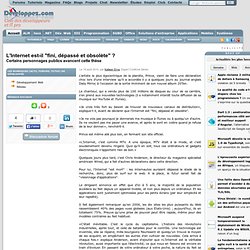
Le chanteur, qui a vendu plus de 100 millions de disques au cour de sa carrière, s'en prend aux nouvelles technologies (il a notamment interdit toute diffusion de sa musique sur YouTube et iTunes). «Je crois très fort au besoin de trouver de nouveaux canaux de distribution», explique-t-il, avant de déclarer que l'Internet est "fini, dépassé et obsolète". «Je ne vois pas pourquoi je donnerais ma musique à iTunes ou à quelqu'un d'autre.
Ils ne veulent pas me payer une avance, et après ils sont en colère quand je refuse de la leur donner.», renchérit-il. Prince est même allé plus loin, en fermant son site officiel. "Le Web est mort" ? Bizarre, son cadavre bouge encore. When Wrong, Call Yourself Prescient Instead. In 1997 Wired Magazine declared the browser dead.
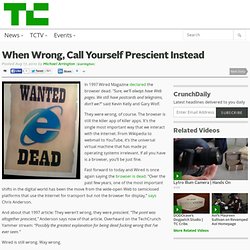
“Sure, we’ll always have Web pages. We still have postcards and telegrams, don’t we?” Said Kevin Kelly and Gary Wolf. They were wrong, of course. The browser is still the killer app of killer apps. Fast forward to today and Wired is once again saying the browser is dead. And about that 1997 article: They weren’t wrong, they were prescient. Wired is still wrong. The new article is based on a foundation of data supplied by Cisco that shows web traffic, as taking a smaller piece of total Internet traffic. The Web Is Dead. Long Live the Internet. Two decades after its birth, the World Wide Web is in decline, as simpler, sleeker services — think apps — are less about the searching and more about the getting.
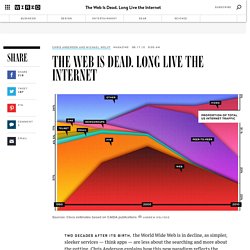
Chris Anderson explains how this new paradigm reflects the inevitable course of capitalism. And Michael Wolff explains why the new breed of media titan is forsaking the Web for more promising (and profitable) pastures. Who’s to Blame: Us As much as we love the open, unfettered Web, we’re abandoning it for simpler, sleeker services that just work. by Chris Anderson You wake up and check your email on your bedside iPad — that’s one app. You’ve spent the day on the Internet — but not on the Web. This is not a trivial distinction. A decade ago, the ascent of the Web browser as the center of the computing world appeared inevitable. But there has always been an alternative path, one that saw the Web as a worthy tool but not the whole toolkit. “Sure, we’ll always have Web pages. Who’s to Blame: Them Chaos isn’t a business model. Is the web really dead? Wired uses this graph to illustrate Chris Anderson and Michael Wolff's claim that the world wide web is "dead.
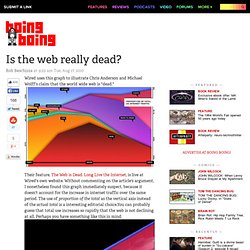
" Their feature, The Web is Dead. Long Live the Internet, is live at Wired's own website. Without commenting on the article's argument, I nonetheless found this graph immediately suspect, because it doesn't account for the increase in internet traffic over the same period. The use of proportion of the total as the vertical axis instead of the actual total is a interesting editorial choice.You can probably guess that total use increases so rapidly that the web is not declining at all. Perhaps you have something like this in mind: Wired Declares The Web Is Dead—Don’t Pull Out The Coffin Just Yet. The Web is dead, or at least in decline, declares Wired editor Chris Anderson in the magazine’s September cover story.
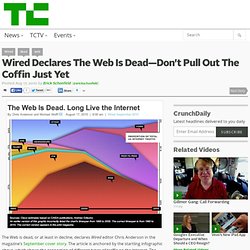
The article is anchored by the startling infographic above, which shows the proportion of different types of traffic on the Internet. The Web, HTML traffic visible though a browser, is only about a quarter (23%) of the overall traffic, down from about half a decade ago. It’s been pushed down by peer-to-peer (23%), video (51%), and other types of apps which use the Internet for transport but are not browser-based. It’s not clear what exactly Wired is counting as video, but presumably it is not all of the Flash video on YouTube which is very much part of the Web. Setting aside whether Wired massaged the numbers to make its chart look pretty, Anderson’s larger point is that increasingly we are consuming information via apps other than the browser.